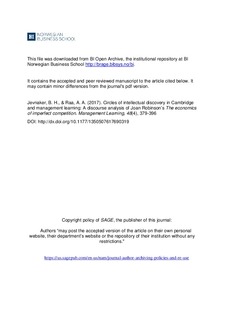Circles of intellectual discovery in Cambridge and management learning: A discourse analysis of Joan Robinson’s The Economics of Imperfect Competition
Journal article, Peer reviewed
Accepted version
Permanent lenke
http://hdl.handle.net/11250/2463897Utgivelsesdato
2017Metadata
Vis full innførselSamlinger
- Publikasjoner fra CRIStin - BI [1015]
- Scientific articles [2181]
Sammendrag
In this article, we explore a circle of younger-generation economists at Cambridge who contributed to new theories in the 1930s. The aim was to understand how and why innovative thinking in academic theorizing, seen as situated, discursive practices, can emerge and gain ground. We also address how new theory building by an unlikely candidate, Joan Robinson, could unfold. We examine how there was a change in discourse related to imperfect markets and identify forming practices. Our perspective on how knowledge was reframed is Foucauldian. The study is grounded in archive studies, recent reviews and biographical material. This article contributes to learning, knowledge creation and communities of practice by exploring idea innovations as discursive practice. We propose ‘epistemic interaction’ as a sensitizing concept for understanding new theory building and theorizing in collaborative partnerships and small circles that became key to intellectual discovery.
Beskrivelse
The accepted and peer reviewed manuscript to the article
